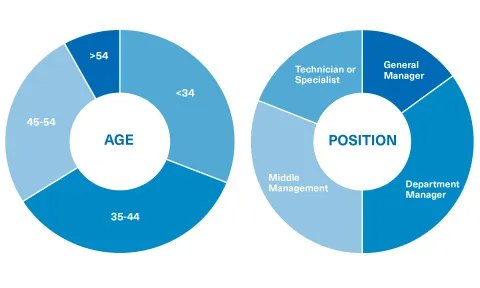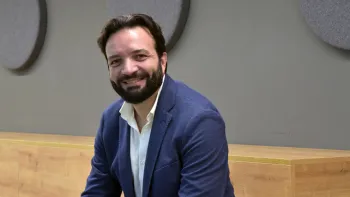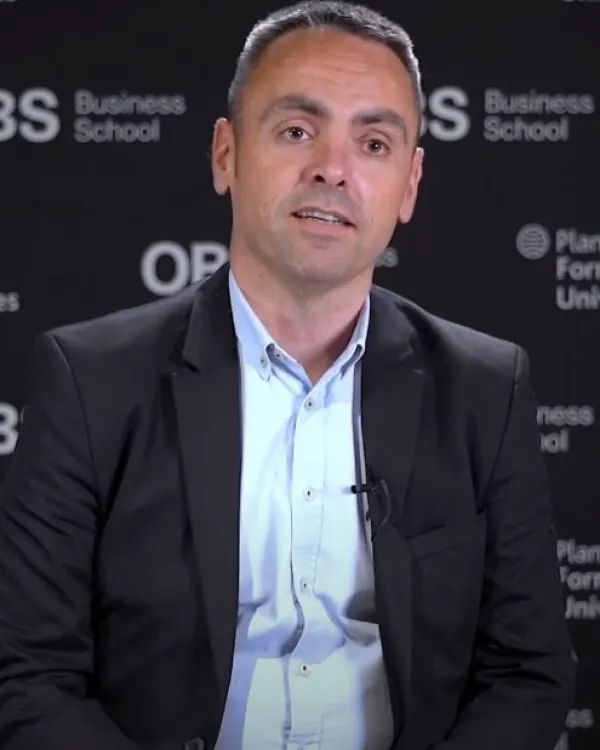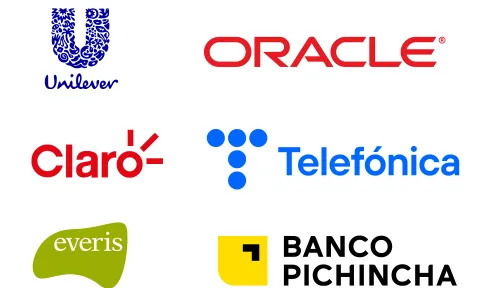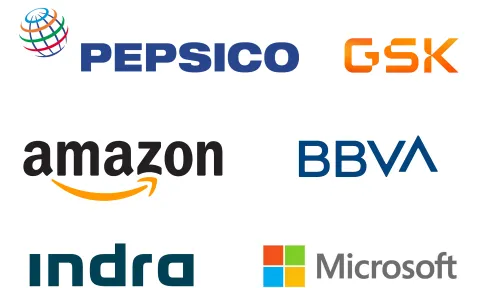
Global MBA
- ONLINE
- 60 ECTS
- 13900€
- OPEN CALL
- 12 MONTHS
- SPANISH
The Global MBA provides professionals with an international approach to implementing and managing cross-functional and competitive strategies within organizations by developing managerial skills and competencies.
This MBA has been included among the best Online MBAs in the world according to the prestigious rankings of Financial Times and El Mundo. In addition, it is ranked #1 Best MBA according to the FSO 2025 Ranking; it is among the Top 5 worldwide in the CEO Magazine Global Online MBA Ranking, and holds the Top 4 Best MBA position according to Eduniversal.

Global MBA (Spanish)

Universitat de Barcelona
Get a double degree from our academic partner, the reference university in Catalonia and Spain with more than 560 years of history behind it.

Ranking El Mundo
Our Global MBA is recognized as one of the Best Online MBAs to study in Spain, according to the TOP 20 Educational Centers from international ranking El Mundo.

Online Higher Education Ranking
In the latest edition of the FSO Ranking (2025), OBS' Global MBA ranked Nº1 as the undisputed leader.
Global MBA Syllabus
Our program is structured in 4 blocks and culminates with the MBA Final Project. In addition, during the program you will take part in a voluntary bootcamp and in different additional activities.
Block 1. Strategy in a Global Environment
Block 2. Management of Functional Areas in a Global Environment
Block 3. Development of Executive Skills
Block 4. Development of Management Skills
MBA Final Project
Bootcamps and Additional Activities
1. Strategy in a Global Environment
The development of international business requires a great ability to analyze the main macroeconomic forces (cultural, political, legal and economical). Knowledge and interpretation of the evolution of economic integration processes, and the role of government within the international business environment, will allow the manager to identify the main challenges and business opportunities at any given time.
Professor: José Manuel Santamans Caballero, Communication Director Rector of the Polytechnic University of Valencia (UPV).
VIEW LINKEDIN
This module covers a number of basic concepts and analytical techniques relating to competitive advantage in global organizations. It deals with classic and contemporary issues of importance, such as industry analysis, organizational core competency, top management and corporate governance teams, the scope of product and market decisions and value chain analysis. Emphasis is placed on the application of analytical tools to understand complex strategy issues, the design and structure of organizations and how they react to environmental forces and internal power conflicts are studied.
Professor: María José Alaminos, Corporate HR Manager at Healthcademia.
VIEW LINKEDIN
The framework for a global enterprise and an essential tool for the global entrepreneur is a complete and well-developed business plan. The process of creating a business plan provides an in-depth view of the complex interdependence of the functional elements of a viable organization: marketing, finance, management and leadership, systems and operations.
Professor: César Castillo López, Controller & Academic Director at ICIL Foundation.
VIEW LINKEDIN
This course is designed to provide the basic principles of the marketing mix: marketing management strategies, segmentation, targeting and positioning. This module will develop the set of tools necessary to carry out quantitative analysis from the perspective of a marketing manager; the ability to perform an analysis of consumers, competitors and distribution channels and the frameworks to evaluate the similarities and differences between national and international marketing, with the aim of enabling you to successfully implement marketing strategies in international markets.
Professor: Nina Arponen, Global Retail Marketing Manager at Footbalance System Ltd.
VIEW LINKEDIN
This module provides an overview of e-business management in a globalized world economy. Topics covered include technologies that support e-business; the different e-business models and their applications; security issues; electronic payment systems; legal and ethical issues; global issues in digital management; design and implementation issues and the strategy for implementing an e-business.
Professor: Ericka Espino Gonzales, CEO at MaKE and Co-Founder at Read2Give.
VIEW LINKEDIN
The purpose of this course is to introduce the student to the ethics and morals of business management and to business as a social system. The students will learn about the differences between ethics and morals, the role of leadership, the various types of moral theories, the moral basis of the market and sustainability. It also highlights the competitive advantage of the organization based on an understanding of the importance of CSR.
Professor: Remigi Palmés, CEO at Formació Pime, S.L.
VIEW LINKEDIN
2. Management of Functional Areas in a Global Environment
The purpose of the module is to expose the complexity of strategic marketing decisions in a global marketplace. Topics include world consumer markets; the global cultural, legal, political, and economic environment; marketing mix, consumer behaviour and global marketing research.
Professor: Javier de Miguel Luken, Managing Partner at Topminds..
VIEW LINKEDIN
This course provides an overview of the design, control and improvement of industrial production processes and service production systems. Topics include operations strategy, process selection, value stream analysis, quality management, lean manufacturing and supply chain management.
Professor: Ignasi Estruch Goicoechea, Innovation Growth Coordinator at Acció.
VIEW LINEKDIN
This module provides an overview of global sales, which global account management models (multi-country customers) exist, what is the most recommendable organizational structure of the sales department in each case and how to manage the product-market matrix.
Professor: Ana Ruiz Tabares, CMO at Adymus.
VIEW LINKEDIN
The objective of this course is to provide the necessary knowledge on supplier management in a globalized environment, distinguishing the concept of purchasing cost from that of acquisition cost. Questions such as: To what extent is multiple-sourcing valid? How do we balance acquisition and service cost in a globalized environment? In which cases are tenders useful?
Professor: Xavier Rius Poch, Managing director at Fundación ICIL.
VIEW LINKEDIN
Correctly defining the production strategy is a key aspect in the management of global companies: Do we specialize factory to product? How do we manage risk in a globalized and complex production environment? Where do we locate factories, close to markets, close to sources of supply?
Professor: Jaume Alonso Raluy, Director of Operations in Saudi Arabia.
The objective of this module is to understand how to integrate teams and the different human resources policies in the global strategy of the company, taking into account cultural differences, the dispersion of teams and the use of new corporate communication tools. On the other hand, the different types of organizational structures (hierarchical, matrix, agile) and their areas of application will be analysed.
Professor: Eva Díez, Trainer and consultant in talent development and HR management.
VIEW LINKEDIN
Creating a sustainable IT-dependent competitive advantage is an important objective for forward-looking multinational organizations. This module aims to provide students with an understanding of how multinational organizations make strategic use of Big Data to gain a competitive advantage in the global economy. It covers the important technological aspects of Big Data from a managerial point of view. It delves into understanding global data and how it must be standardized to account for differences in collection methods, legal constraints and cultural interpretation to create a reliable platform for evaluation.
Professor: Joan Torres Moreno, Executive Director of Logistics at TransGourmet Ibérica.
VIEW LINKEDIN
The purpose of this course is to introduce multinational financial management and investment decisions. The course studies foreign exchange markets, international portfolio management and the financial management of multinational companies, with emphasis on the use of derivative instruments and operational strategies to hedge exchange rate risk. Topics covered include the international environment and financial markets; exchange rate determination, foreign exchange derivatives, international arbitrage and interest rate parity theory; the relationships between inflation, interest rate and exchange rate; risk rate management, multinational capital budget analysis and global capital structure analysis.
Professor: Juan Fuertes, Administrative-Accounting Manager at Economía Digital Diario Online.
VIEW LINKEDIN
3. Development of Executive Skills
This module aims to deepen the understanding of the challenges, techniques and problems associated with initiating and implementing major changes in an organization. Throughout the course, the objective will be to prepare managers, consultants and advisors to successfully meet the challenges of organizational change. While we will cover the macro (organizational) level of change, we will also focus on its individual level and how the learner, as a manager/consultant, can lead change through their actions and through others.
Professor: Mercè Serrabassa Funoll, International Executive Coach; Skills & Relational Development en Professionali, P&O. Mentoring
VIEW LINKEDIN
In this module, the main techniques of negotiation and conflict resolution in an international environment are presented and applied, with the objective of understanding the steps of the intercultural negotiation process, as well as being able to design strategies that allow you to apply it in specific situations.
Professor: Mirta Palau, Strategy Consultant & Project Manager.
VIEW LINKEDIN
This course is designed to develop global business leaders. This specific module covers the main management issues that companies face when operating internationally. Contents include the current international environment, the effects of globalization on business management, the cultural dimension of international management, communication and cross-cultural leadership.
Professor: Manuel Lucena Giraldo, Research Scientist at the Institute of History, Center for Human and Social Sciences, CSIC.
This module provides a practical approach for leaders and members of virtual and global teams. Topics include techniques for developing trust, shared understanding, performance evaluation, training, technology assessment, and managing through organizational culture. Working in remote teams, using information technology, is critical to today's organizational environment. Activities emphasize critical analysis, coordination of activities, decision making and problem solving within a virtual context.
Professor: Mar Ruiz Villalba, Outplacement Consultant at Right Management.
VIEW LINKEDIN
4. Development of Management Skills
The general objective of this module is to provide knowledge of Planning and Management Control in order to measure the final results in relation to the expected results and to work with effective tools that allows managers to make the best decisions at all times and get closer to the strategic objectives of the organization in a Global environment.
Professor: Jerónima Revelo Parro, Deputy Director European Corporate Controller & Internal Audit at KAO Corporation.
VIEW LINKEDIN
In this module, students will learn how the decision-making process is carried out in the selection of investments and how to determine the value of a company, using the appropriate financial tools. They will also learn about the process of mergers between companies and of purchase and sale (M&A) and what are the advantages and risks derived from the corporate processes.
Professor: Martí Pachamé Barrera, Economic Activity and Finance Area Advisor at Santa Coloma de Gramenet City Council, Catalonia.
VIEW LINKEDIN
In this module we will learn the fundamental concepts of project management and provide a base of knowledge, techniques and tools to be applied in the projects developed in our sphere of influence. The teacher will highlight the key areas of knowledge in global environments, complemented with best practices and methodologies essential in changing and competitive environments.
Professor: Joan Barceló Perelló, Corporate CIO - Chief Information Officer at W2M WORLD2MEET.
VIEW LINKEDIN
Final Project and Additional Activities
This program is designed to complement the content of the thematic blocks with the necessary training to achieve their internalization. The training is conceived from a triple perspective: technical assistance, personal support and individual and group challenges that are necessary to achieve the objectives set.
Pre-Masters Bootcamps
The student will have the opportunity to take 3 Pre-Master Bootcamps that will be opened progressively and can be taken at any time. Once the course has been completed and passed, a certificate of completion will be issued.
- Bootcamp 1. Personal Branding
- Bootcamp 2. Data Storytelling
- Bootcamp 3. Creative Thinking and Innovation Introductory
- Bootcamp 4. Generative AI: Engineering Prompts
In addition, students will also have the opportunity to take these pre-master courses; however, these are available in English only:
- Building Your Professional Brand for Employability and Career Success
- Finance Fundamentals
- Organizational Well-Being
Workshop | Campus Training
Before the start of the academic year, students will have the opportunity to attend an introductory workshop to the Campus where they will be provided with the necessary tools and knowledge for the correct use of the platform during the academic year.
Professional Development Program (PDP)
Two weeks before the start of the academic year, students will be able to participate in a professional development program where they will work hand in hand with a teacher to develop different skills such as time management, productivity, stress management and emotional intelligence. Upon completion of the workshop, and provided that the relevant activities have been carried out, a certificate of completion can be obtained.
As the final work of the MBA program, students will develop a Business Plan. The development of the Business Plan will consist of the realization of a business plan as a practical application of the knowledge acquired during the program. The plan can be made on a new venture or can develop an existing business or company, but on which modifications and variations are proposed that provide added value and a differential advantage over what already exists. However, the ideal is to develop a business idea that could be implemented in the current market.
The work is done under the supervision of the academic department and according to a schedule of partial deliveries that will allow monitoring its development. The Business Plan is a group project that will be carried out in teams, with very justified exceptions.
Professor: Joan Barceló, CIO at W2M WORLD2MEET.
VIEW LINKEDIN
The Global MBA is complemented by conferences, bootcamps, debates and seminars taught by renowned professionals in business management who present their experiences and case studies through videoconferences.
Bootcamp | Management Development
This bootcamp is designed to complement the content of the thematic blocks with the necessary training to achieve their integration. The training will be conceived from a threefold perspective: it will start with technical assistance, provide personal support to the participant and, at the end, will pose the necessary challenges to achieve the objectives set. In addition, the degree of progress in the development of resources will be measured and the necessary improvement measures will be practiced.
Professor: Eva Díez, Trainer and consultant in talent development and HR management.
VIEW LINKEDIN
Bootcamp | Business Etiquette & Protocol in China & India
Through practical examples and debates on general and business etiquette, these bootcamps aim not only to help students create an awareness of the cultural differences they may face in the Chinese and Indian economies, but also to enable them to develop an appreciation and understanding of these differences in order to behave appropriately, avoid mistakes and communicate more effectively with others. Students will be taught about international etiquette and the norms and idiosyncrasies observed in these economies.
Professor: Tom Van der Hyden, Co-Founder and CEO at S3 Group.
VIEW LINKEDIN
Professor: Rut Castell Morella, Fundadora All in logistic.
VIEW LINKEDIN
Virtual Exchanges and COILs
During the development of the program, students will be given the option to participate in a virtual exchange with the university TEC de Monterrey, where they will complete a course that will later be validated in the OBS curriculum.
Additionally, they will be able to participate in a COIL (Collaborative Online International Learning) with students from the university TEC Monterrey and CENTRUM in Peru.
*Spots for both activities are limited to a maximum number of participants.
Company visits
During the program, students will have the opportunity to attend synchronous videoconferences with experts in each area. They will share their experiences and best practices in their sector.
Webinars
Most of the training is done asynchronously, which means that this exchange of knowledge is done through a platform that allows sharing written texts without the need for people to be connected at the same time. Additionally, in each of the modules, synchronous sessions or 'webinars' are organized, where all participants are connected at the same time through an application, which allows the exchange of knowledge in 'real time'.
Students taking the Global MBA at OBS Business School will have the opportunity to prepare for the following certifications*:
- Scrum Master & Product Owner Certification
- Scrum Master@Scale Certification
- Product Owner@Scale Certification
- Value Stream Management Certification
*The cost of the certifications and the preparatory course are not included in the price of the program.
Methodology

OBS has an online methodology where the student is always at the core of the process. Said methodology is backed by active and internationally renowned professors who share their knowledge to enhance the professional development of students through a flexible, collaborative method with personalized monitoring. The goal is to create a unique educational experience that allows the assimilation of knowledge in a practical way.
Given that the fundamental pillar of the Student ON methodology is the student, each of them has their own Program Manager throughout the course, an academic figure that accompanies the student in a personalized way.
Diploma
After successfully completing the Master's degree, you will receive the Master's degree from OBS Business School. In addition, as long as you meet the established documentation, payment and administrative requirements, you will be able to obtain a Lifelong Learning Master's degree from the University of Barcelona (UB).
In order to obtain it, you must have a university degree. In the exceptional case of not having this degree and having passed the Master's evaluations, you will obtain a Higher University Diploma from the University of Barcelona (UB).
At OBS Business School we are committed to our own degree, which allows us to update the programmes in each edition in order to be at the forefront of the knowledge demanded by companies today. Our programmes are designed for professionals who want to update their management skills and live and enriching and international experience, which is why we base our value proposition on a global academic approach.
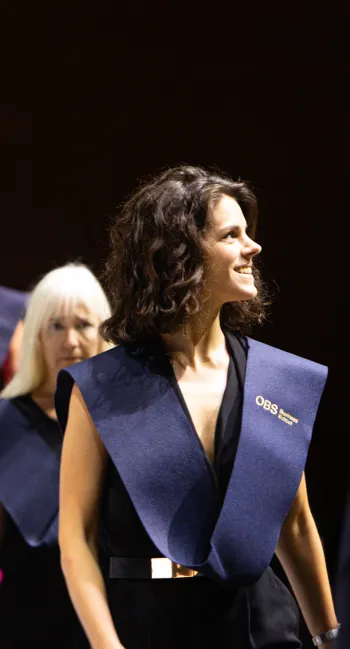
Admission Process
The fundamental objective of our admissions process is to ensure the suitability of candidates. All participants should get the most out of this learning experience, through a context in which it is possible to develop long-term relationships with classmates, faculty and alumni.
In order to be admitted to the Global MBA, students must have a university degree or higher, with a minimum of 5 years of professional or managerial experience to ensure optimal development of the programme.
After completing the application form for one of our programmes, you will receive an e-mail with information about the School and a member of the Admissions Department will contact you to start the admission process.
Once you have successfully passed the personal interview, you must submit all the required documentation to continue the admission process and certify that you meet the requirements of the student profile. After the Admissions Committee, if it is positive, you will be able to register and enrol in the programme you have applied for.

Student’s Profile
Global MBA students have an average of 11 years of work experience, come from 23 countries and share a common goal: to enhance their management skills and boost their professional careers. Year after year, the most prominent multinationals and companies from different sectors count on their talent, making a clear commitment to diversity, internationalization and leadership.
